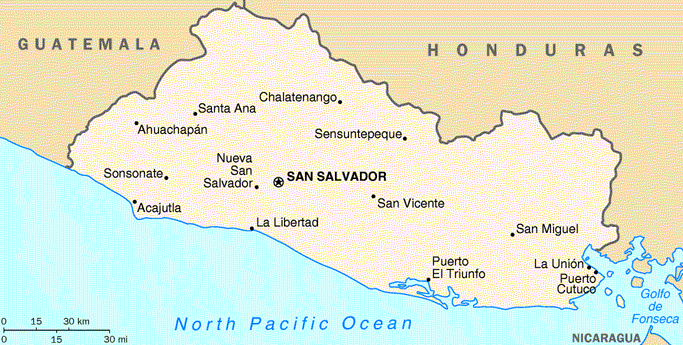
Status Quo Side: Government
Non-Status Quo Side: Leftist rebels
Region: Western Hemisphere
Conflict Type: External Intervention
Issues in Dispute: Governance Strategic

Independent since 1841, El Salvador was ruled by a landed oligarchy with military support. Vast inequalities in wealth plus dependence on coffee exports created instability. A 1932 Farabundo Marti revolt was crushed with a massacre. Elected President Jose Maria Lemus was overthrown in 1960. Violence, boycotts and fraud charges marked elections in 1962 and 1967.
A military coup supporting Christian Democrat candidate Jose Napoleon Duarte failed after a close election with no clear winner. He was tortured and exiled. Leftist groups with external ties began bombings and kidnappings, while rightist death squads, believed linked to government, began an escalating pattern of executions. On October 15 1979 Cols. Jaime Abdul Gutierrez and Adolfo Arnoldo Majano led a reformist coup as business elites fled with their capital. Civilian junta leaders resigned in early 1980 to protest repression and failure to implement promised reforms.
Government troops fired on demonstrators. A state of siege was declared in rural areas. Military elements assassinated Archbishop Oscar Arnulfo Romero. In April 1980, 18 leftist groups united and in October created a paramilitary affiliate, the Farabundo Marti National Liberation Front (FMLN). Charges of human rights violations escalated. Thousands (including three American nuns) were killed, allegedly by government forces. The junta reorganized under Duarte, the first civilian president in 49 years. FMLN activity increased. Elections in 1984 and 1985 strengthened Duarte's party as did a major commitment of military funds and training by the US, where intervention became a disputed Cold War issue. Successive peace talks from 1985 to 1991 failed. Rebel attacks dwindled as government displaced some half-million people and economic conditions deteriorated. With a dying Duarte marginalized, rebels offered in January 1989 a 60-day cease-fire and participation if elections were postponed. The request was denied and right-wing ARENA candidate Alfredo Christiani took power June 1 1990 after an election marked by boycotts and disrupted polling. Christiani received some $1 million a day in US aid. October saw a massive rebel offensive and the death squad murder of 6 Jesuit priests.
Under UN auspices the government and five guerrilla commanders agreed on military and economic steps to end the conflict. Peace accords were signed on January 16 1992.
A cease-fire went into effect, ending a war that took took 75,000 lives.
The agreed measures moved ahead under the guidance of a UN observer mission, ONUSAL, which completed its work and departed in late April 1995.